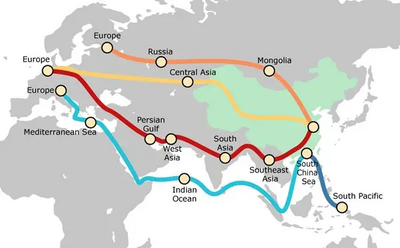On 29 June 2015, following the Liberal International British Group AGM at the National Liberal Club, [we] were treated to a talk by China expert and independent consultant, Andrew Leung on "The Silk Road and the Fragrant Harbour - China and HK in a transformed world".
Galloping through close to 70 slides Andrew tried to impart to us in a limited time some of his vast knowledge. He started by describing the new world order as "multi-polar", "flat, connected and dynamic." As we move from G7 to G20 nations, there are an increasing number of areas where we will need to work co-operatively, whether in tackling the challenges of climate change or in space exploration.
China's rise, on the other hand, is nothing new; there was a time in history between the Tang Dynasty in the 7th century till the industrial revolution in the early 19th century, when China held the number 1 position in the world. In 2010 she overtook Japan as the 2nd largest economy and was poised to overtake the US by 2030.
Accompanying China's rapid growth, were a host of new problems, such as the rise of the trade unions, potential social unrest and the "monster of corruption". The world had been gripped by details of the Bo XiLai scandal involving the former Party Secretary of ChongQing, his wife and the murder of an Englishman. More recently the conviction of Zhou YongKang, former Minister of Security and member of the Standing Committee, sent shock waves through the country and signalled President's Xi Jin Ping's strength within the Party.
It was however the topic of the new Silk Road ("One Belt One Road") that managed to excite the most interest at the talk. This was the new frontier, where East meets West. China, the great pioneering nation, has been investing vast amounts in new infrastructure by rail and sea to forge ever closer economic links with her neighbouring countries. And to finance her global ambitions, the AIIB (Asian Infrastructure Investment Bank) was set up to rival the IMF and the World Bank.
And what was the relevance of all this for us in the UK? Andrew suggested that there were equally vast opportunities for the UK, not only as one of the founding members of AIIB, but also as China expands westwards, we would be the recipient of much of her capital investments and as one of the top destinations for Chinese tourists and students.
The presentation then moved on to the topic of Hongkong. In this area Andrew showed himself to be more conservative than liberal. Rather than commenting on the current political impasse between the Chief Executive and the Legislative Council, he dwelled instead on factual observations of the situation in HongKong, such as the frustrations facing HongKongers with the influx of Chinese visitors and migrants (a population of 7 million coping with 47 million visitors from China a year!) Admittedly there were widening inequalities with power held by big business in HongKong, but in his view the umbrella movement and the demands of the Pan Democrats for universal suffrage were somewhat idealistic and unrealisable.
The talk was followed by a lively Q&A chaired by LIBG Chair-elect Phil Bennion. Was a strong EU in China's interest? What is China's budget on defence? Is the Chinese Communist Party at risk of losing control? How can the Pan Democrats be able to influence the executive in Hongkong moving forward?
To wrap up the evening, Joyce Arram gave a formal response and a vote of thanks on behalf of LIBG.

